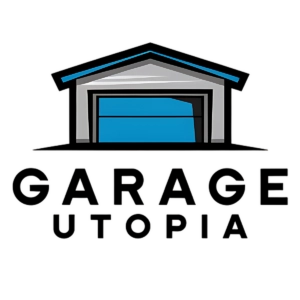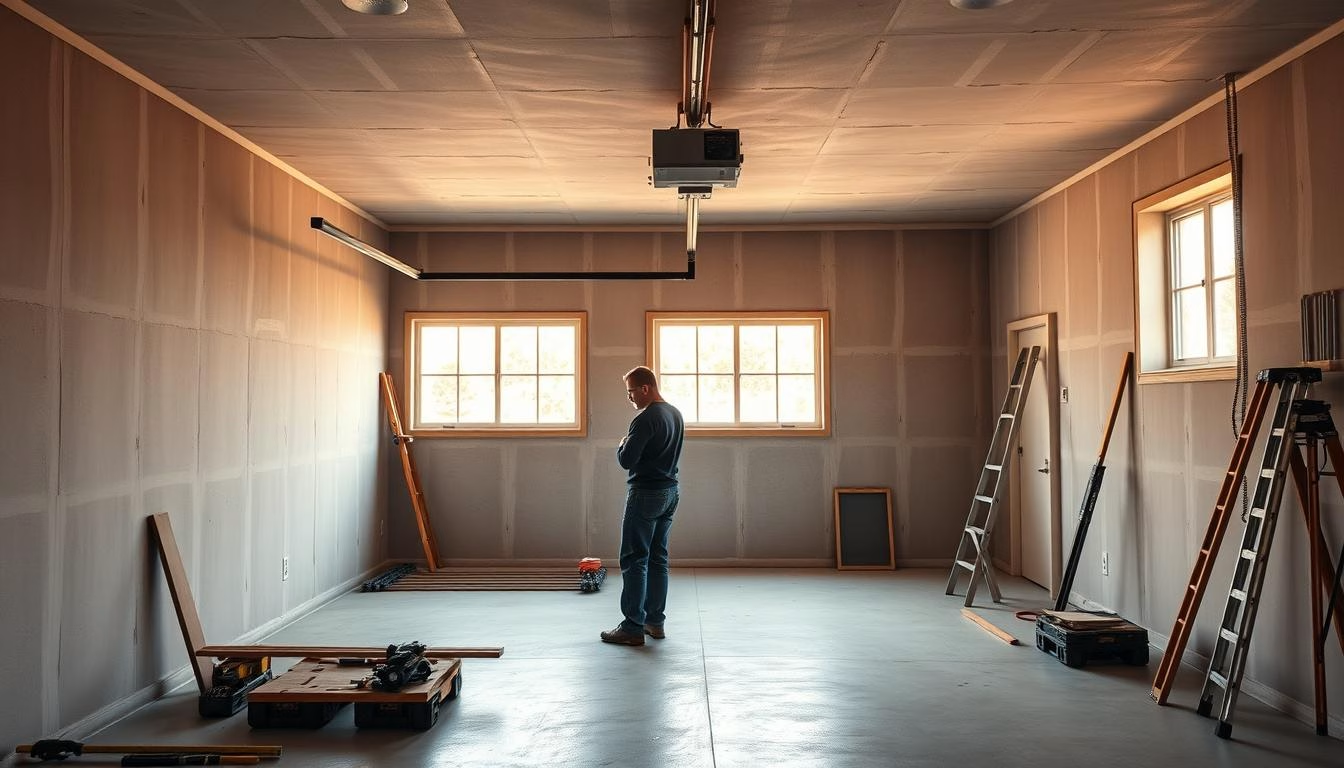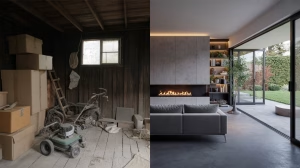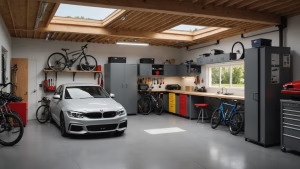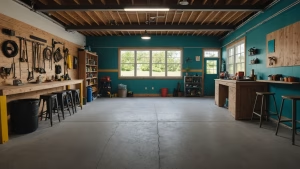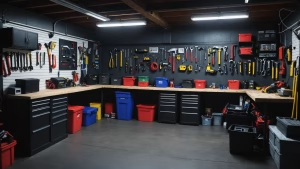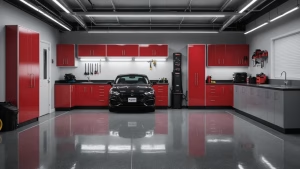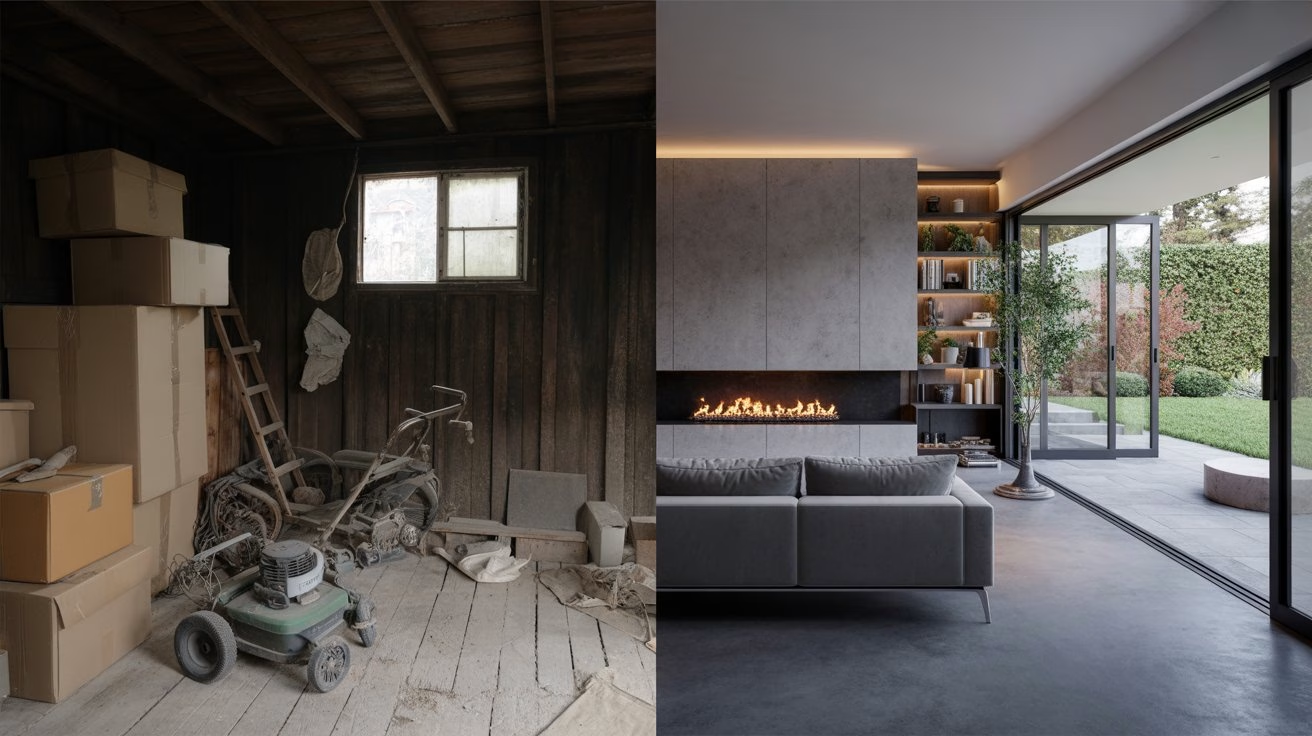Drywalling a garage is crucial for improving both its functionality and appearance. The cost for a 20 x 20 garage can vary, typically between $1,000 and $3,900. This range is influenced by several factors, including the quality of materials, local labor rates, and the complexity of the installation. On average, homeowners can expect to spend around $2,000, making it a significant yet worthwhile investment for your garage renovation.
Understanding Drywall: A Quick Overview
Drywall is a key component in many construction projects, especially for interior walls and ceilings. It strikes a balance between affordability and functionality, making it a favorite for various uses, including garage drywalling. Knowing its definition, types, and benefits helps homeowners make better decisions about their properties.
What is Drywall?
Drywall, also known as gypsum board, is made of gypsum plaster sandwiched between two heavy paper sheets. It’s prized for its ease of installation, simple upkeep, and cost-effectiveness. With drywall, homeowners can achieve smooth, attractive wall surfaces perfect for painting or finishing.
Types of Drywall for Garages
Choosing the right drywall type is crucial, especially for garages facing unique challenges. Standard 1/2″ drywall is commonly used for general purposes. Moisture-resistant drywall is ideal for humid areas, while fire-resistant drywall is essential for safety, especially in garages connected to living spaces. This variety allows homeowners to pick the best option for their needs.
Benefits of Drywalling Your Garage
Drywalling your garage offers several advantages. It provides fire protection, significantly lowering fire risks. It also reduces noise, creating a quieter space. Moreover, drywall enhances lighting, making the garage brighter. Drywalling boosts aesthetic appeal, increasing property value, making it a smart investment for homeowners looking to upgrade their garage.
Cost Breakdown of Drywalling a Garage
Understanding the total cost of drywalling a garage is crucial. The overall expense includes material costs, labor for installation, and additional costs. This breakdown aids homeowners in better planning their projects.
Material Costs
The type of drywall chosen greatly affects material costs. Standard drywall prices range from $0.50 to $0.80 per square foot. Specialized options like moisture-resistant or fire-rated drywall can cost $1.50 to $3.00 per square foot. These prices reflect the garage’s specific needs and desired durability.
Labor Costs
Labor for drywall installation is a significant part of the budget. Costs usually range from $1.00 to $2.70 per square foot. Project complexity and regional labor rates influence these prices. Finding a balance between quality and affordability is key for homeowners.
Additional Expenses to Consider
Homeowners should also budget for extra costs related to drywalling. These include:
- Insulation installation: $0.50 to $3.00 per square foot
- Paint and primer
- Necessary tools for installation
- Cleanup costs after the project
Each of these factors adds to the total drywall expenses. Thorough planning is necessary to avoid unexpected costs during the project.
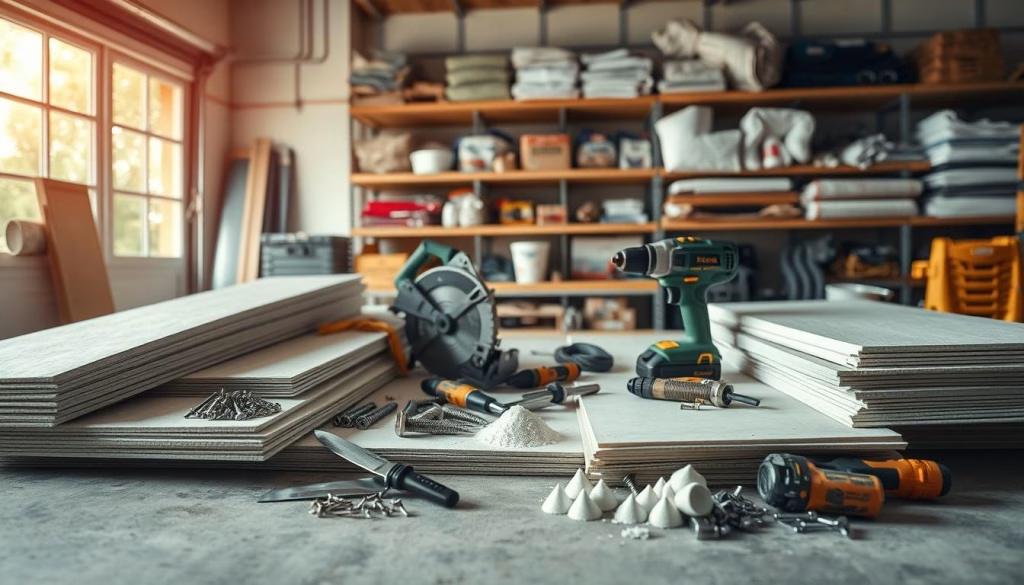
Factors Influencing the Cost of Drywall Installation
Understanding the factors that affect drywall cost is essential for homeowners. Several elements play a role in determining the total cost of drywall installation in a garage. These include the garage’s size and layout, local labor rates, and potential accessibility challenges.
Size and Layout of the Garage
The garage size significantly impacts costs. Larger spaces require more materials, which can increase the price. Irregular layouts may also require extra planning and labor, adding to the expense. Assessing the garage’s dimensions and shape accurately helps in setting a realistic budget.
Local Labor Rates
Labor rates for drywall installation vary widely by region. Urban areas often have higher costs due to the demand for skilled workers. In contrast, rural areas may offer lower prices. Understanding local market conditions and pricing trends can help homeowners save money.
Accessibility Challenges
Accessibility can greatly affect the installation process. Garages with awkward angles, tight spaces, or special equipment needs will increase labor costs. Identifying potential challenges early can prevent unexpected expenses and ensure a smoother project.
Considering these factors will give homeowners a clearer understanding of their drywall installation budget in garages.
Average Estimated Cost for a 20 x 20 Garage
Homeowners looking to install drywall in a 20 x 20 garage need to know the average cost. The total cost usually ranges from $1,000 to $3,900. This estimate includes both materials and labor, affecting the overall price.
Cost Per Square Foot Breakdown
The cost for drywalling a garage varies from $1.50 to $3.50 per square foot. A 20 x 20 garage has about 800 square feet. To find the total cost, multiply the square footage by the chosen price per square foot. Keep these factors in mind when estimating the cost for your garage:
| Size (sq ft) | Low Estimate ($1.50/sq ft) | High Estimate ($3.50/sq ft) |
|---|---|---|
| 800 | $1,200 | $2,800 |
Summary of Total Cost Estimates
The total cost for drywall in a 20 x 20 garage varies widely. It depends on the type of drywall, local labor rates, and extra materials like insulation. Getting multiple bids is key to understanding the final cost.
DIY vs. Professional Installation for Drywall
Choosing between DIY garage drywall and hiring a contractor depends on several factors. These include your budget, skill level, and the complexity of the project. Each choice has its own set of advantages and disadvantages, affecting your experience and the outcome.
Pros and Cons of DIY Drywalling
Going the DIY route can save you money. You can manage costs for materials and labor, with smaller projects costing between $200 and $400. This method lets you work at your own pace. However, it requires time, experience, and the right tools. Some common hurdles include:
- Pros: Cost savings, flexible timeline, personal satisfaction with the work.
- Cons: Time-consuming, potential for errors, and a less professional finish.
When to Hire a Professional
For larger spaces or complex projects, hiring a drywall contractor might be the better choice. Professionals offer expertise and efficiency, ensuring a high-quality finish. They also ensure compliance with local building codes. This option is ideal when:
- The garage has unique architectural features.
- You lack the necessary skills and tools.
- Time is a constraint, making DIY impractical.
Average Costs Comparison
Knowing the average costs for drywall installation helps make informed decisions. For a 20 x 20 garage, DIY materials can cost between $200 and $400. On the other hand, professional installation can cost up to $3,900, depending on the project’s scope and local rates. Here’s a detailed comparison:
| Method | Cost Range |
|---|---|
| DIY Garage Drywall | $200 – $400 for materials |
| Hiring a Drywall Contractor | Up to $3,900 for installation |
Essential Tools and Materials for Drywalling
When planning to drywall a garage, it’s crucial to gather the right tools and materials. The right tools ensure efficiency and help achieve a professional finish. Here’s a guide on the must-have tools, recommended drywall materials, and essential safety gear to consider.
Must-Have Tools for DIY Installation
Investing in the right drywall tools can significantly impact your project. Key tools for a successful DIY installation include:
- Drywall lift for easy handling and support
- T-square to ensure accurate cuts
- Utility knife for precise trimming
- Drywall screw gun for efficient fastening
Recommended Drywall Materials
Choosing the best materials is vital for durability and performance. The following options are among the recommended drywall materials for garage use:
- Standard 1/2″ drywall for general applications
- Moisture-resistant drywall in areas prone to dampness
Safety Gear Considerations
For a safe installation experience, utilizing appropriate drywalling safety gear is essential. Always prioritize safety with these items:
- Safety goggles to protect your eyes from dust
- Dust masks to prevent inhalation of particles
- Knee pads for comfort when working on the floor
Preparatory Steps Before Drywalling
Before starting drywall installation, several preparatory steps are crucial for success. Begin by inspecting and repairing the garage’s framing and insulation. This initial step can prevent future issues and save time.
Inspections and Repairs
Inspecting the garage thoroughly is vital. Look for signs of water damage, mold, or structural weaknesses. Fixing these issues before drywalling ensures a solid foundation for your project.
Acclimating Drywall to Garage Conditions
Acclimating drywall to the garage environment is key to avoiding warping or cracking. Allow the drywall to sit in the garage for at least 48 hours. This step helps it adjust to local temperature and humidity, ensuring stability and longevity.
Creating a Clear Work Environment
An organized workspace is essential for efficient and safe drywall installation. Clear the area of clutter, tools, and equipment. Adequate lighting is also critical, facilitating accurate measurements and reducing accident risks.
Common Mistakes to Avoid in Drywalling
During the drywall process, several pitfalls can impact the project’s quality and cost. Homeowners often encounter challenges that lead to delays or unsatisfactory results. Recognizing and avoiding these mistakes can significantly improve the final outcome.
Miscalculating Material Needs
One common error is miscalculating material needs. Underestimating drywall requirements can cause last-minute store trips, disrupting the workflow. On the other hand, buying too much drywall wastes resources and increases costs. Careful planning is key to avoiding material allocation errors.
Poor Hanging Techniques
Poor hanging techniques can severely affect the drywall’s durability and appearance. Incorrect fastener placement can cause sagging panels or unsightly seams. It’s essential to provide ample support at seams for a solid structure. Emphasizing proper finishing techniques ensures a clean, professional look.
Inadequate Finishing
Another error is neglecting adequate finishing. Skipping steps like mudding or sanding may seem quick, but it compromises the walls’ look and integrity. Focus on proper finishing techniques for a smooth, polished finish that enhances the work’s quality.
Maintenance Tips After Drywall Installation
Once drywall is installed in your garage, maintaining it is crucial for its longevity and durability. Proper care ensures the drywall’s aesthetic appeal and enhances garage functionality. Here are essential tips for maintaining your space.
Keeping Your Garage Dry and Mold-Free
Keeping the garage dry is a fundamental aspect of drywall maintenance. Effective ventilation and humidity control are key to preventing mold. Utilize exhaust fans, dehumidifiers, or air circulation to manage moisture levels. Regularly inspect for leaks or damp spots to avoid costly repairs.
When to Touch Up or Repair
Wear and tear, such as dents or minor cracks, can occur over time. Knowing when to repair these issues is crucial. A simple sand and paint can restore your walls’ appearance. Regularly inspect the drywall to catch any damage early.
Long-Term Care for Drywalled Surfaces
Long-term care involves monitoring for cracks or impacts that could worsen. Use gentle cleaning methods and avoid abrasive tools to preserve the surface. Regular inspections and proactive care will extend your drywall’s life, keeping your garage valuable.
